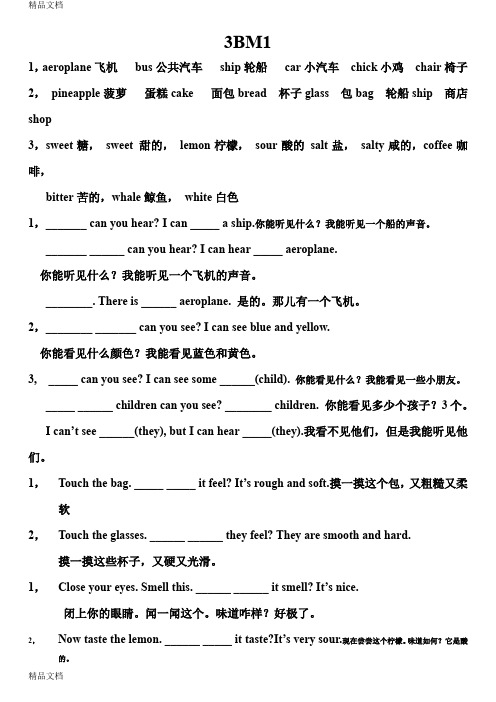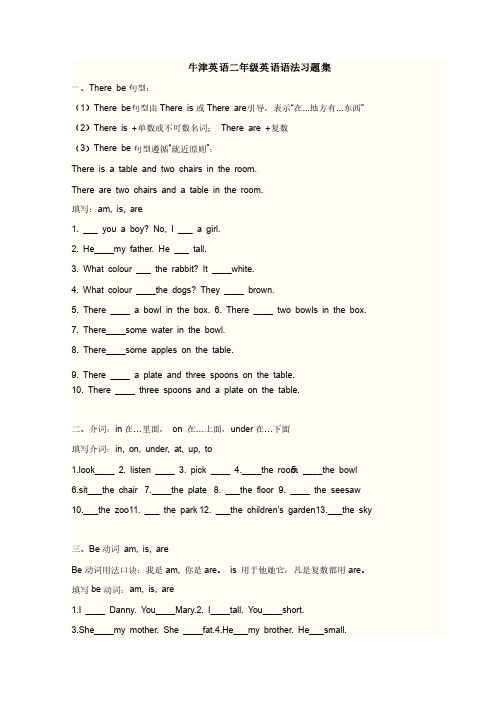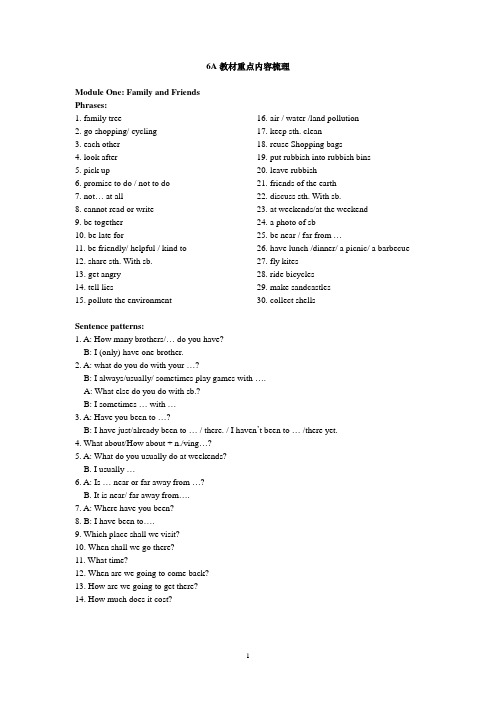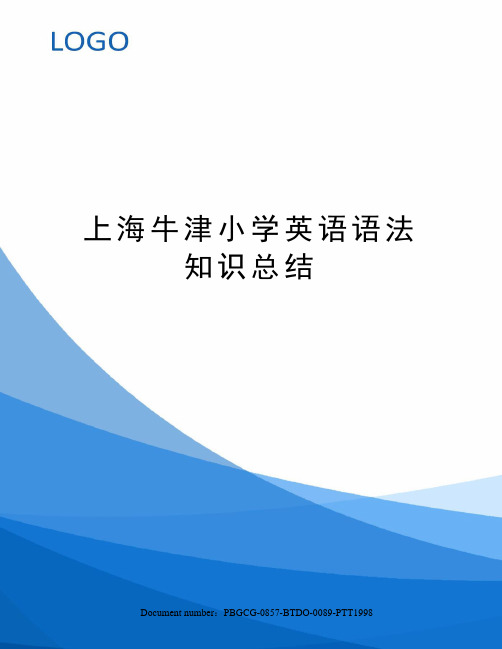牛津英语上海版常用句型
最新上海牛津英语3B-核心句型资料

1,aeroplane飞机bus公共汽车ship轮船car小汽车chick小鸡chair椅子2,pineapple菠萝蛋糕cake 面包bread 杯子glass 包bag 轮船ship 商店shop3,sweet糖,sweet 甜的,lemon柠檬,sour酸的salt盐,salty咸的,coffee咖啡,bitter苦的,whale鲸鱼,white白色1,_______ can you hear? I can _____ a ship.你能听见什么?我能听见一个船的声音。
_______ ______ can you hear? I can hear _____ aeroplane.你能听见什么?我能听见一个飞机的声音。
________. There is ______ aeroplane. 是的。
那儿有一个飞机。
2,________ _______ can you see? I can see blue and yellow.你能看见什么颜色?我能看见蓝色和黄色。
3, _____ can you see? I can see some ______(child).你能看见什么?我能看见一些小朋友。
_____ ______ children can you see? ________ children. 你能看见多少个孩子?3个。
I can’t see ______(they), but I can hear _____(they).我看不见他们,但是我能听见他们。
1,Touch the bag. _____ _____ it feel? It’s rough and soft.摸一摸这个包,又粗糙又柔软2,Touch the glasses. ______ ______ they feel? They are smooth and hard.摸一摸这些杯子,又硬又光滑。
1,Close your eyes. Smell this. ______ ______ it smell? It’s nice.闭上你的眼睛。
(完整版)上海牛津小学英语语法知识总结

上海牛津小学英语语法知识总结一般现在时1、定义:表示经常发生或习惯性的动作、状态。
句中通常有usually,often,every day,sometimes,always,at weekends,on Sundays等表示经常性时间的短语。
2、构成:1)当谓语是be动词时,一般现在时的构成:主语+be动词+其他如:I am a student. He is Jim’s father.They are from Japan.2)当谓语是行为动词时,一般现在时的构成:①主语(非第三人称单数)+动词原形+其他如:I often watch TV at the weekends.Mr Green and Mrs Green like collecting stamps.②主语(第三人称单数)+动词的第三人称单数形式+其他如:Jim usually visits his grandparents on Sundays.She sometimes goes to the park with her mother.3、动词三单形式的变化规则:•一般情况下,直接加s 如:read-reads,swim-swims•以s,x,sh,ch,o结尾,加es 如:wash-washes,watch-watches,do-does•以辅音字母+y结尾,变y为i,再加es 如:study-studies,fly-flies•不规则变化如:have-has4、一般现在时的句型转换:肯定句否定句一般疑问句及回答They watch TV every day. They don’t watch TVevery day.—Do they watch TV every day?—Yes, they do. / No, they don’t.She watches TV every day. She doesn’t watchTV every day.—Does she watch TV every day?—Yes, she does. / No, she doesn’t.现在进行时1、定义:表示现在或现阶段正在进行或发生的动作。
牛津英语上海五年级上册知识点重点单词句型(完整版)

M1U1第2页get to know you 了解你an ‘orange’ party 一个橘色派对come to my birthday party 来参加我的生日聚会on Sunday 在周日on the ninth of September = on September the ninth 在九月九号at two o’clock in the afternoon = at 2:00 p.m. 在下午两点bring or wear some orange things to the party 带或穿一些橘黄色的东西来参加聚会my favourite colour 我最喜欢的的颜色be moved 很感动的That sounds interesting/ funny. 听起来很有趣/滑稽。
I can’t wait. 我等不及了。
give sb a big surprise 给某人一个惊喜be surprised 很惊讶的第3页1. 单词:一月到十二月in January, February, March, April, May, June, July, August, September, October, November, December2. 序数词:第一到第三十一见书序数词前+the 例如:the first第4页at Peter’s birthday party 在Peter的生日聚会上 a pair of orange trousers 一条橘色裤子a picture of you /him/her 一张你的图片make your own(invitaion) 做你的请柬have some fun = have a good time = enjoy ourselves 玩得开心make a birthday invitation 做一张生日请柬invite sb to the party 邀请某人去聚会live in Room 301 住在301室live on Yongqing Road 住在永清路live at Room 301, Building 9, 58 Yongqing Road 住在永清路58号9号楼301室近义词(同义词):begin – start interesting – funny present – gift复数:party – parties Sunday – Sundays第5页Tommy’s birthday present Tommy的生日礼物be busy doing sth. 忙于做某事the next morning 第二天早上 a smart new hat 一顶漂亮的新帽子a hat maker 一个做帽子的人be tired of sweets 厌倦糖果be late for school 上学迟到反义词:come – go bring – take interesting – boring busy – free sad – happy late – early next – last new – old easy – hard / difficult第6页drill 钻孔least 最少at least 至少leave 离开leave home 离开家last but not least 最后但也是最重要的(用于作文最后一段)句型1. When does the first class begin? It begins at 8:30.(begin 是动词,不要与is连用,三单动词加“s”。
沪教版牛津小学二年级英语语法

牛津英语二年级英语语法习题集一、There be 句型:句型:(1)There be 句型由There is 或There are 引导,表示“在...地方有...东西” (2)There is + 单数或不可数名词;单数或不可数名词;单数或不可数名词; There are + 复数复数复数 (3)There be 句型遵循“就近原则”:There is a table and two chairs in the room. There are two chairs and a table in the room. 填写:am, is, are 1. ___ you a boy? No, I ___ a girl. 2. He____my father. He ___ tall. 3. What colour ___ the rabbit? It ____white. 4. What colour ____the dogs? They ____ brown. 5. There ____ a bowl in the box. 6. There ____ two bowls in the box. 7. There____some water in the bowl. 8. There____some apples on the table. 9. There ____ a plate and three spoons on the table. 10. There ____ three spoons and a plate on the table. 二、介词:in 在…里面,里面, on 在…上面,under 在…下面下面填写介词:in, on, under, at, up, to 1.look____ 2. listen ____ 3. pick ____ 4.____the room 5. ____the bowl 6.sit___the chair 7.____the plate 8. ___the floor 9. ____ the seesaw 10.___the zoo11. ___ the park 12. ___the children’s garden13.___the sky三、Be 动词动词 am, is, are Be 动词用法口诀:我是am, 你是are 。
6A上海牛津英语六年级第一学期重点词组和句型

6A教材重点内容梳理Module One: Family and FriendsPhrases:1. family tree2. go shopping/ cycling3. each other4. look after5. pick up6. promise to do / not to do7. not… at all8. cannot read or write9. be together10. be late for11. be friendly/ helpful / kind to12. share sth. With sb.13. get angry14. tell lies15. pollute the environment 16. air / water /land pollution17. keep sth. clean18. reuse Shopping bags19. put rubbish into rubbish bins20. leave rubbish21. friends of the earth22. discuss sth. With sb.23. at weekends/at the weekend24. a photo of sb25. be near / far from …26. have lunch /dinner/ a picnic/ a barbecue27. fly kites28. ride bicycles29. make sandcastles30. collect shellsSentence patterns:1. A: How many brothers/… do you have?B: I (only) have one brother.2. A: what do you do with your …?B: I always/usually/ sometimes play games with ….A: What else do you do with sb.?B: I sometimes … with …3. A: Have you been to …?B: I have just/already been to … / there. / I haven’t been to … /there yet.4. What about/How about + n./ving…?5. A: What do you usually do at weekends?B. I usually …6. A: Is … near or far away from …?B. It is near/ far away from….7. A: Where have you been?8. B: I have been to….9. Which place shall we visit?10. When shall we go there?11. What time?12. When are we going to come back?13. How are we going to get there?14. How much does it cost?Module Two: Places and Activities Phrases:1. a bank clerk2. a shop assistant3. put out fires4. cook food5. make our city a safe place6. look at7. listen to8. arrive at9. have tea10. at the entrance11. on the ground/ first floor12. on the open day13. at half past eight in the morning14.First,../ Next,…/Then,…/After that,…/Finally, …15.take photos16. by ferry/ by underground/ on foot17. on the bus 18. go to school19. a lot of/ some/ a few20.live near/far away from school21.an advertisement board22. light rail23. a department store24. a housing estate25. a police station26. half an hour27. wait for28. walk on the grass29. keep quiet30. run across the road31. pick the flowers32. turn left/right33. on the right/left34. in the middle35. go upstairsSentence patterns:1.A: Would you like to be a/an…?B: Yes, I would.//No, I wouldn’t.A: Why?/Why not?B: I would /wouldn’t like to be a/an…because I…2.A: What would you like to be?B: I would like to be…3.A: Do you live near or far away from …?B: I live near/far away from ….A: How do you go to school?B: I go to school by…/on foot.A: How long does it take?B: It takes …4.A: How long does it take you to get to…?B: It takes me about…to get there.5.A: What does Simon see when he is walking to school?B: Simon sees ...when he is walking to school.6. What does this sign mean?7. We must not eat or drink./Don’t eat or drink.8. We must …9. A: Which escalator must we use?B: We must use the one in the middle.Module Three: Food and Drink phrases1. fried cabbage/chicken wings2. steamed prawns with garlic3. boiled eggs4. a shopping list5. at the vegetable stall6. in the frozen food section7. in the market/supermarket8. have a picnic9. a bottle of jam10. a packet of nuts11. a slice / slices of 12. an unhealthy diet13. do exercise14. live in the countryside15. stay with sb.16. plenty of / a lot of17. a little/ some18. my favourite breakfast19. too much spicy food20. eating habits21.the food pyramidSentence patterns:1.A: What would you like for dinner tonight?B: I’d like … for dinner.A: What kind of … would you like?Would you like … or …?B: I’d like…2.A: Have you bought any…?B: Yes, I’ve bought some…A: Where did you buy it/them?B: In the market, at the…stall/in the…section.A: How much was it/were they?B: It was /They were…yuan.3.A: Shall we buy some soft drinks?B: Ok./ That’s a good idea.4.Let’s buy some bread and a bottle of jam.Let’s go to the supermarket to buy some food and drink for the picnic.5.A: Would you like some…?B: No, thanks / yes, please6.A: Why do you like…?B: I like it/them because it’s/they’re sweet/delicious/tasty/spicy.7.A: Why not?B: I don’t want … because it is too ….8.A: May I have some …, please?B. Ok/ Sure/ All right/ Yes, you may. Here you are.//NO, you may not./ I’m afraid you can’t..9.A: How much sugar do we need every day?B: We need a little sugar every day.10.A: Which one was healthier/less healthy?B: …’s diet was healthier than/less healthy than/as healthy as/as unhealthy as …’s diet.11.How much … do we need?12.What do you usually have for breakfast/ lunch /dinner?13.A: What did you have for breakfast yesterday?。
牛津上海版七年级英语上册Unit1重点句型及能力训练

Unit1重点句型及能力训练Key sentence structure1. I haven’t seen my cousins before. 我以前没见过我的堂弟、堂妹。
★ before在本例中是个副词,意为“在……之前,在……以前”的意思,用于引导时间状语从句。
如:They haven’t been to the USA before. 他们以前没有去过美国。
2. It’s cheaper and more interesting. (坐火车)更便宜,而且更有趣。
★本句中使用了形容词cheap和interesting的比较级。
3. Let’s talk to Mum and Kitty. 我们跟妈妈还有基蒂谈谈吧!★ talk to意为“与……交谈”。
我们通常用talk to sb.或talk with sb.来表示“与……交谈”的含义。
They taught the little boy not to talk to strangers. 他们教育小男孩不要和陌生人说话。
4. I’m going to get some brochures from the travel agent. 我打算到旅行社代理人那里拿些小册子。
★本例中,get...from...意为“从……处得到”。
I get my pocket money of 200 yuan every month from my mother.我每个月可以从妈妈那儿拿到200元零用钱。
5. Yes, we’d like to travel to Beijing by plane. 是的,我们想坐飞机去北京。
★ would like to do sth. 意为“想要做某事”,相当于want to do sth. 如:I’d like to have a swim in the sea. 我想去海里游泳。
(= I want to have a swim in the sea.)★travel to...意为“到……旅游”,相当于have a trip to...。
上海牛津小学英语语法知识总结

上海牛津小学英语语法知识总结Document number:PBGCG-0857-BTDO-0089-PTT1998上海牛津小学英语语法知识总结一般现在时1、定义:表示经常发生或习惯性的动作、状态。
句中通常有usually,often,every day,sometimes,always,at weekends,on Sundays等表示经常性时间的短语。
2、构成:1)当谓语是be动词时,一般现在时的构成:主语+be动词+其他如:I am a student. He is Jim’s father. They are from Japan.2)当谓语是行为动词时,一般现在时的构成:①主语(非第三人称单数)+动词原形+其他如:I often watch TV at the weekends.?Mr Green and Mrs Green like collecting stamps.②主语(第三人称单数)+动词的第三人称单数形式+其他如:Jim usually visits his grandparents on Sundays.She sometimes goes to the park with her mother.?3、动词三单形式的变化规则:•一般情况下,直接加s 如:read-reads,swim-swims•以s,x,sh,ch,o结尾,加es 如:wash-washes,watch-watches,do-does•以辅音字母+y结尾,变y为i,再加es 如:study-studies,fly-flies•不规则变化如:have-has•4、一般现在时的句型转换:肯定句否定句一般疑问句及回答They watch TV every day. They don’t watch TVevery day.—Do they watch TV every day—Yes, they do. / No, they don’t.She watches TV every day. She doesn’t watchTV every day.—Does she watch TV every day—Yes, she does. / No, she doesn’t.现在进行时1、定义:表示现在或现阶段正在进行或发生的动作。
新版牛津英语上海版A知识点归纳

新版牛津英语上海版A知识点归纳1.问候与自我介绍:- Hello! Hi! Good morning!等常见的问候用语。
- What’s your name? My name is...等自我介绍用语。
2.数字与颜色:-数字1-10的基本表达。
- 常见颜色的英文表达,如红色(red)、绿色(green)等。
3.询问年龄与身体状况:- How old are you? I’m...等询问年龄的用语。
- How are you? I’m fine/good.等询问身体状况的用语。
4.询问喜欢与不喜欢的事物:- Do you like...? Yes, I do./No, I don’t.等询问喜欢事物的用语。
- What do you like? I like...等回答自己喜欢的事物的用语。
5.熟悉家庭与常见动物:- 基本的家庭成员的表达,如father、mother、brother、sister等。
- 常见动物的英文表达,如dog、cat、bird等。
6.询问与描述外貌与人物特征:- What’s he/she like? He/She is...等询问与描述外貌与人物特征的用语。
7.学习日常用语:- May I go to the toilet, please? Can I have some water, please?等日常学习用语。
8.描述天气与季节:- What’s the weather like today? It’s sunny/rainy/cloudy.等描述天气的用语。
- 四个季节的英文表达,如spring、summer、autumn、winter等。
9.描述日常活动与习惯:- I get up at 7 o’clock. I go to school at 8 o’clock.等描述日常活动与习惯的用语。
10.描述食物与饮料:- 常见食物与饮料的英文表达,如apple、orange、milk、juice等。
- 1、下载文档前请自行甄别文档内容的完整性,平台不提供额外的编辑、内容补充、找答案等附加服务。
- 2、"仅部分预览"的文档,不可在线预览部分如存在完整性等问题,可反馈申请退款(可完整预览的文档不适用该条件!)。
- 3、如文档侵犯您的权益,请联系客服反馈,我们会尽快为您处理(人工客服工作时间:9:00-18:30)。
牛津英语上海版常用句型(七年级上册)1. sb. would like to do sth. “愿意做某事”(Unit 1 RA)如:1) I would like to go shopping with my mother this Sunday.2) Would you like to go shopping with me?2. one of the +形容词最高级+名词复数“最……之一”(Unit 1 RB)如:Beijing is one of the biggest cities in the world.3. “花费”的几种表达法:(Unit 2 RB)1) 人+ spend/spends/spent + 时间/金钱+ (in) doing sth./on sth如:I spent one hour on (in doing) the housework..2) 人+ pays/paid + 钱+ for + sth. 如:I paid one hundred yuan for the dress.3) It takes/took + 人+ 时间/钱+ to do sth.如:It took me fifteen minutes to read the text this morning.4) 物+ costs/cost + 人+ 钱如:The bike cost me four hundred yuan.4. 1)比较级+ and + 比较级“越来越…….”(Unit 5 MP)如:Our country is getting more and more beautiful.2)the + 比较级,the + 比较级“越……就越……”如:The more you eat, the fatter you are. 5. It is + adj. + (for sb.) + to do sth. (Unit 4 RB)如:It is important for us to learn English well.6. Will/Would you please (not) do…?“请你做……好吗?”(Unit 5 Listening B)如:Would you please be more careful next time?7. Thank you for sth / doing sth. (Unit 5 Listening B) 如:Thank you for helping me.8….(be) too +adj.(原级)(for sb.) to do sth. (对某人来说)……太……而不能…… (Unit 7 MP) 如:He is too young to go to school. The box is too heavy for me to carry.以上句型可以与下列句型互换:1) …(be) not + adj. (反义词的原级) + enough (for sb.) to do sth.如:He is not old enough to go to school. The box is not light enough for me to carry. 2)…(be) so + adj. (原级) +that sb. can/ could/can’t/couldn’t do sth. (如此…以致可以/不可以做….)如:He is so young that he can’t go to school. The box is so heavy that I can’t carry it.9. Why don’t you do…? = Why not do...? “为什么不……呢?” (此为提建议的表达方法。
) (Unit 7 RA)如:Why don’t you go there? = Why not go there?提建议的表达方法还有:Shall we do…? / Let’s do…! / What about doing…? / How about doing…?10. 1) used to do sth. 过去常常做某事(Unit 8 RA)否定:didn’t use to do sth.疑问:Did…use to do…?如:I used to go for a walk in the park. 否定:I didn’t use to go for a walk in the park.2) be / get used to doing sth. 习惯做某事如:I am used to going for a walk in the park.11. be not…but…“不是……而是……” (Unit 8 RA) 如:It is not a cat but a tiger.单项选择:( )1.Would you like ____ my birthday party this evening?A. comeB. comesC. comingD. to come( )2.He is one of ______ in our class.A. popular studentB. the most popular studentsC. the most popular student( )3.He spent two hours _____ his homework last night. A. do B. does C. doing D. to do ( )4.It took them three years ______ the hospital. A. build B. to build C. to built D. building ( )5. The workers ___ two months building the bridge. A. spent B. took C. paid D. cost ( )6. It ____ me half an hour to finish my homework. A. spent B. took C. paid D. cost ( )7. He ____ much money on books every month. A. spends B. takes C. pays D. costs ( )8. The colour TV set ____ them a lot of money. A. spent B. took C. paid D. costs ( )9. The jacket ____ so much that we didn’t buy it. A. paid B. spend C. took D. cost ( )10. ---How much is your new dictionary? --- It ____ me 30 yuan.A. tookB. costC. paid D spent( )11.He ____ 45 yuan for these flowers. A. took B. cost C. paid D spent( )12.The boy is getting _____.A. taller and tallerB. tall and tallerC. taller and tallD. tall and tall( )13. You’re getting ______.A. clever and cleverB. cleverest and cleverestC. cleverer and clevererD. more and more cleverer( )14. Guangzhou is getting _____.A. beautiful and beautifulB. beautifuler and beautifulerC. more beautiful and more beautifulD. more and more beautiful( )15._____ we do exercise , _______ we are.A. More, the healthierB. The more, the healthierC. The more, healthierD. More, healthier ( )16._____ is easy ___ him _____ to school on time.A. It, of, to goB. That, for, toC. It, for , to goD. It , for, going( )17.It’s very difficult ____ the work in a short time.A. to finishB. finishC. finishesD. finishing( )18. ____ is hard ____ on the Great Green Wall.A. This, to workB. It, to workC. That, workingD. Its, working( )19. It is easy ____ him ____ climb this hill. A. to, to B. for, for C. to, for D. for, to ( )20.Would you please ____ there on time? A. to get B. getting C. getting D. get( )21. Will you please _____ me with my English?A. helpB. to helpC. helpingD. helped( )22.Thanks for _____ me to your party. A. invite B. to invite C. inviting D. invited( )23.The box is ____ heavy for him ____ carry. A. to, too B. too, to C. so, that D. so, to ( )24.The hall is ___ five hundred people.A. big enough to holdB. enough big to holdC. big enough holdingD. enough big held ( )25.He is _____ strong ____ he can carry the heavy box.A. too, thatB. so, thatC. too, toD. to, too( )26.Why not ____ there with your mother? A. go B. to go C. goes D. going( )27.He used ____ in the river, but he swims in the swimming pool now.A. swimB. swimmingC. to swimD. to swimming( )28.They are used ______ to school by bike. A. to go B. to going C. go D. going ( )29.Will you please ____ late for school next time? A. not be B. not C. not to be D. not are完成句子:1.李明是班上学习最好的学生之一。
